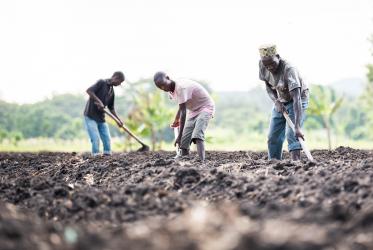Dr Mathews George Chunakara, general secretary of the Christian Conference of Asia (CCA), addressed young people attending an Eco-School in Chiang Mai, Thailand, noting that large numbers of people in Asia don’t have access to safe drinking water.
Chunakara, who also pointed out that many people in the region lack basic food and nutrition, said that the climate emergency calls for very urgent mitigative interventions. “It will be too late too soon unless there is proactive intervention from all stakeholders,” he said.
Jointly organised by the World Council of Churches (WCC) and CCA and supported by the World Student Christian Federation Asia Pacific region, the Eco-School closed with 27 young people vowing to nurture “blue communities” and green churches when they return home.
As they visited the Karen community in Chiang Mai, they saw firsthand the harsh realities of the lack of food and water brought on by the climate emergency. At the same time, Eco-School participants celebrated their distinct cultures living together in community.
Workshops covered topics such as water justice; climate justice at global, regional and local levels; and addressing advocacy concepts and tools. Participants also heard summaries of the Intergovernmental Panel on Climate Change reports and global interventions thus far on climate change.
Participant Rev. Elina Otu, from West Timor, Indonesia, said: “The Eco School made me understand the ecology of my region in a critical way. I was able to relate how lack of water and its subsequent impact through droughts and loss of livelihood can also give rise to migration and human trafficking. Upon my return I will practice and promote eco-friendly lifestyles in my church such as planting trees and rainwater harvesting, and I’ll be an eco-ambassador for our church.”
Eunique da Graca del Vasconselos, 18, from East Timor, the youngest participant of this year’s Eco-School, said: “I learned how water and food are interconnected with nature and how millions of poor do not have access to these resources. For example, only eight multi-national corporations control the world’s food industries at the cost of the poor farmers. The impact of climate change is felt already, particularly in Asia. If we do not act now, we will regret it.” On her follow up plan of action, she said, “I will start planting trees and will minimize the use of bottled water.”
Another participant, Suyeon Lee, from the Korean Student Christian Federation, said: “In South Korea, most people, including me, do not face the challenges of food, water and climate change. I think that is climate injustice. Because our contribution to climate change is very high. In Korea we have a problem of excessive dependence on single-use plastic. When I go back from the Eco-School I will try to reduce our plastic use.”
"WCC Eco-School begins in Thailand" - WCC news release 7 November 2019
Learn more about WCC work on Care for Creation and Climate Justice







